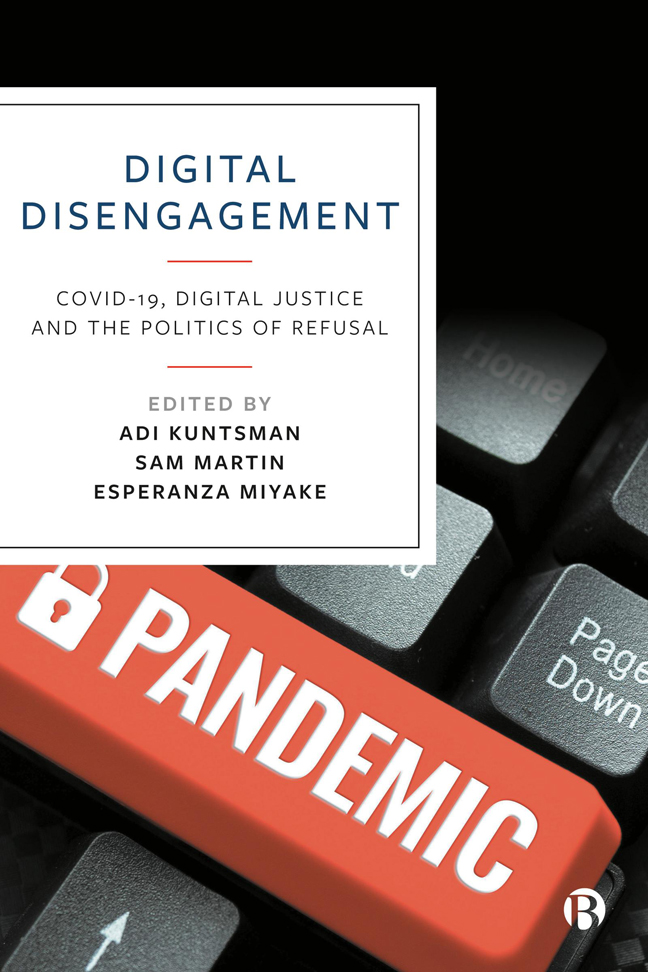Book contents
- Frontmatter
- Contents
- Notes on Contributors
- Introduction
- One En/forcing the Tokyo 2020 Olympics: The Racialization of Digital Engagement and Digital Solutionism
- Two Digital Engagements and Work–Life Balance in Creative Labour
- Three ‘#RoeVsWadeOverturned: Any Idea How Fast Your #PeriodtrackingApp Can Lead To Jail?’: Digital Disengagement and the Repeal of Roe vs Wade
- Four #SnailMailRevolution: The Networked Aesthetics of Pandemic Letter-Writing Campaigns
- Five Data Minimalism and Digital Disengagement in COVID-19 Hacktivism
- Six Digital Solutionism Meets Pandemic Imaginaries
- Seven State Violence, Digital Harms and the COVID-19 Pandemic: Imagining Refusal, Resistance and Community Self-Defence
- Epilogue: Digital Disengagement – Questions of Pandemic and Post-Pandemic Digitalities
- Index
Seven - State Violence, Digital Harms and the COVID-19 Pandemic: Imagining Refusal, Resistance and Community Self-Defence
Published online by Cambridge University Press: 25 January 2024
- Frontmatter
- Contents
- Notes on Contributors
- Introduction
- One En/forcing the Tokyo 2020 Olympics: The Racialization of Digital Engagement and Digital Solutionism
- Two Digital Engagements and Work–Life Balance in Creative Labour
- Three ‘#RoeVsWadeOverturned: Any Idea How Fast Your #PeriodtrackingApp Can Lead To Jail?’: Digital Disengagement and the Repeal of Roe vs Wade
- Four #SnailMailRevolution: The Networked Aesthetics of Pandemic Letter-Writing Campaigns
- Five Data Minimalism and Digital Disengagement in COVID-19 Hacktivism
- Six Digital Solutionism Meets Pandemic Imaginaries
- Seven State Violence, Digital Harms and the COVID-19 Pandemic: Imagining Refusal, Resistance and Community Self-Defence
- Epilogue: Digital Disengagement – Questions of Pandemic and Post-Pandemic Digitalities
- Index
Summary
Seeta Peña Gangadharan is a media and communication scholar and one of the co-founders of Our Data Bodies (https://www.odbproject.org/), a US-based team exploring the ways that digital information on low-income and racialized communities is collected, stored and used by governments and corporations. She has written extensively on the relationships between technologies, and exclusion, marginalization and injustice.
Patrick Williams is a UK-based critical criminologist who has focused, for many years, on racial discrimination and racism shaping the Criminal Justice system. More specifically, his work addresses the over-policing and over-criminalization of Black, Asian and other minority ethnic communities in the UK. Most recently, he has published a number of articles and reports on ‘data driven policing’ and on encroachment of tech into structures of institutional and state violence.
Adi Kuntsman: The three of us are very familiar with your work and are much inspired by it. We want to open this conversation by asking you generally about your work on the relationships between state violence, such as policing or warfare, and systemic injustices of racism, and enforced uses of digital technologies. How do these feature in your work, and how do you see the possibilities, or maybe lack thereof, for escaping or refusing the digital and what that might depend on?
Patrick Williams: First, a quick overview of some of the work that I have been involved with, and just as a way of making sense of some of this, it's important for me to acknowledge that the analysis of tech was never really at the fore of the work I was involved with – which is why I am quite pleased to be in this space with Seeta who has a much better understanding of these issues than I do. My work, for 20 years, has been concerned with the over-policing, racial disparities, discrimination and racist police in the criminal justice and law enforcement systems. However, the more recent pieces of work that I have been involved in have forced me to begin to think about the emergence and encroachment of technology into policing.
- Type
- Chapter
- Information
- Digital DisengagementCOVID-19, Digital Justice and the Politics of Refusal, pp. 154 - 175Publisher: Bristol University PressPrint publication year: 2023



